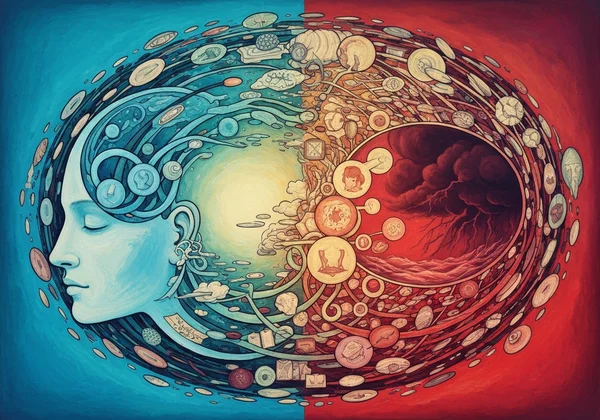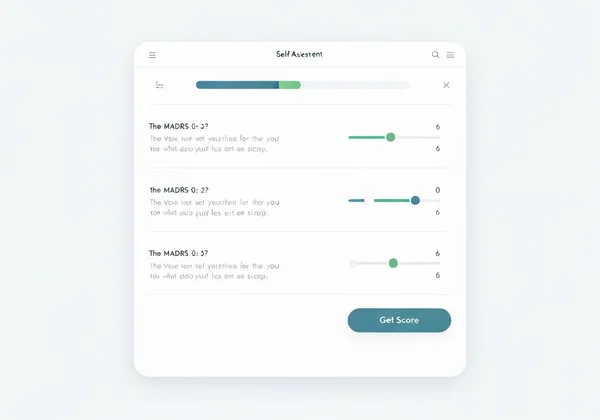10 Sintomas Centrais da Depressão e Como a Escala MADRS os Avalia: Um Guia de Avaliação da Depressão de Montgomery-Åsberg
Sentir tristeza persistente, fadiga ou uma falta geral de interesse pode ser confuso e isolador. Você pode estar se perguntando, como saber se tenho depressão? Compreender os sinais específicos é o primeiro passo para a clareza e para encontrar apoio. Este guia irá ajudá-lo a entender os sintomas centrais frequentemente associados à depressão, explicar como eles se relacionam com uma ferramenta clinicamente confiável chamada Escala de Avaliação da Depressão de Montgomery-Åsberg (MADRS), e capacitá-lo a dar um passo informado em direção à compreensão do seu bem-estar mental. Ao aprender a reconhecer esses sinais, você pode articular melhor seus sentimentos e iniciar um caminho para se sentir mais como você mesmo. Você pode começar essa jornada com uma avaliação confidencial hoje.

Quais são os Sinais Comuns da Depressão?
A depressão é mais do que apenas um mau humor; é uma condição complexa que afeta como você se sente, pensa e lida com as atividades diárias. Seus sintomas podem variar de emocionais a físicos, e sua intensidade pode variar. A escala MADRS é especificamente projetada para medir a gravidade desses sintomas-chave, fornecendo uma pontuação clara e quantificável que pode ser incrivelmente perspicaz. Vamos explorar as dez áreas centrais que ela avalia.

Humor Deprimido e Tristeza: Mais do que Apenas Sentir-se Para Baixo
Este é frequentemente o sintoma mais reconhecido. É um sentimento avassalador de tristeza, vazio ou desesperança que não desaparece. Ao contrário da tristeza temporária, este humor deprimido é consistente e pode colorir toda a sua percepção do mundo. A escala MADRS avalia a intensidade desta tristeza, desde momentos passageiros até um estado constante de melancolia e desânimo que parece inescapável.
Perda de Interesse e Prazer (Anedonia): Sentindo Falta da Alegria
Seus hobbies favoritos perderam o encanto? Anedonia é a capacidade reduzida de sentir prazer em atividades que você antes gostava, seja passar tempo com entes queridos, ouvir música ou se dedicar a um projeto apaixonante. Este sintoma pode fazer a vida parecer monótona e sem cor. A avaliação MADRS mede isso explorando sua perda de interesse no ambiente e nas atividades, um indicador crucial do impacto da depressão.
Distúrbios do Sono: Noites Inquietas ou Sono Excessivo?
A depressão pode perturbar gravemente seus padrões de sono. Para alguns, isso significa insônia — dificuldade em adormecer, permanecer dormindo ou acordar muito cedo. Para outros, manifesta-se como hipersonia, ou dormir por períodos excessivamente longos e ainda assim sentir-se exausto. O questionário MADRS pergunta especificamente sobre esses distúrbios para medir o quão significativamente a qualidade do seu sono foi comprometida.
Alterações no Apetite e Peso: Não Apenas Uma Dieta
Sua relação com a comida pode ser um barômetro para seu estado mental. A depressão frequentemente causa uma diminuição ou aumento notável no apetite, levando à perda ou ganho de peso não intencional. Você pode se encontrar sem desejo de comer ou, inversamente, usando a comida para lidar com emoções difíceis. Este sinal físico é um componente chave de uma avaliação abrangente de saúde mental.
Fadiga e Perda de Energia (Lassidão): Cansaço Constante
Isso não é apenas o cansaço normal após um longo dia. A lassidão é uma profunda sensação de exaustão que não é aliviada pelo descanso. Pode fazer com que até as tarefas mais simples, como sair da cama ou tomar um banho, pareçam monumentais. Este sintoma esgota seus recursos físicos e mentais, e a escala MADRS ajuda a quantificar o quanto essa falta de energia está impactando sua capacidade de funcionar diariamente.
Dificuldade de Concentração: A Névoa Mental
Muitas pessoas com depressão descrevem experimentar uma "névoa cerebral". Isso envolve dificuldade em se concentrar, lembrar detalhes ou tomar decisões. Você pode se encontrar lutando para se concentrar em um livro, seguir uma conversa ou completar tarefas no trabalho. Este sintoma cognitivo pode ser frustrante e isolador, e avaliar sua gravidade é uma parte fundamental para entender sua condição geral.
Sentimentos de Desvalorização ou Culpa: Autoculpa
A depressão frequentemente distorce a autopercepção, levando a sentimentos intensos de desvalorização ou culpa excessiva e inadequada. Você pode se encontrar ruminando sobre falhas passadas ou culpando-se por coisas que não são sua culpa. Essas autoavaliações negativas são um fardo pesado, e a escala MADRS aborda esses padrões de pensamento para entender sua contribuição para seu sofrimento.
Tensão Interna e Agitação: Inquietação Interior
Enquanto algumas pessoas com depressão experimentam uma desaceleração, outras sentem uma sensação de tensão interna ou inquietação. Isso pode se manifestar como irritabilidade, agitação ou uma sensação de estar no limite. É um tumulto interno que pode ser difícil de descrever, mas é uma fonte significativa de desconforto. A ferramenta MADRS ajuda a medir essa experiência interna de ansiedade e mal-estar.
Perspectiva Pessimista e Pensamentos Negativos: Uma Visão Obscurecida
Uma visão consistentemente pessimista do futuro é uma marca registrada da depressão. Isso envolve acreditar que as coisas nunca vão melhorar ou que você é incapaz de mudar suas circunstâncias. Esses pensamentos pessimistas podem parecer consumir tudo e criar um ciclo de desesperança. Reconhecer e medir esse padrão cognitivo é essencial para uma imagem completa do seu estado mental.
Pensamentos de Automutilação ou Suicídio: Quando Buscar Ajuda Imediata
Este é o sintoma mais sério da depressão. Se você está tendo pensamentos de se machucar ou de acabar com sua vida, é um sinal de que precisa de ajuda profissional imediata. A escala MADRS inclui uma pergunta sobre este tópico porque é um indicador crítico de depressão grave. Se você estiver em crise, entre em contato com uma linha de apoio a crises ou serviços de emergência imediatamente. Sua vida é valiosa.
Compreendendo os Sintomas da Depressão Maior e Quando Agir
Reconhecer esses sintomas é o primeiro passo, mas compreender sua importância é o que o capacita a agir. Não se trata de ter um dia ruim, mas de um padrão persistente que interfere em sua vida.
Identificando Sintomas Persistentes: Quando Prestar Atenção
Um fator chave na identificação de depressão clinicamente significativa é a duração e o impacto. Esses sintomas estão presentes na maior parte do dia, quase todos os dias, por pelo menos duas semanas? Eles estão dificultando seu funcionamento no trabalho, na escola ou em seus relacionamentos? Se a resposta for sim, é hora de prestar muita atenção e buscar mais informações.
O Papel das Ferramentas de Autoavaliação
É aqui que uma ferramenta estruturada pode ser incrivelmente útil. Em vez de tentar dar sentido a sentimentos vagos, uma autoavaliação fornece uma estrutura clara. A ferramenta MADRS online ajuda você a organizar suas experiências em uma pontuação quantificável. Essa pontuação não é um diagnóstico, mas é um dado valioso — um instantâneo do seu estado atual que pode ajudá-lo a entender a gravidade dos seus sintomas e facilitar uma conversa mais produtiva com um profissional de saúde.
Por Que o Diagnóstico Profissional é Essencial
As ferramentas de autoavaliação são para orientação e monitoramento, não para diagnóstico. Apenas um profissional de saúde qualificado, como um médico, psiquiatra ou psicólogo, pode fornecer um diagnóstico preciso de depressão. Eles considerarão seus sintomas, histórico médico e outros fatores para determinar o melhor curso de ação. Use seus resultados do teste MADRS online como ponto de partida para iniciar essa importante conversa.
MADRS: Seu Primeiro Passo na Medição da Gravidade da Depressão
A Escala de Avaliação da Depressão de Montgomery-Åsberg (MADRS) é reconhecida globalmente como um "padrão ouro" para avaliar a gravidade dos sintomas depressivos. Foi desenvolvida por clínicos para clínicos, mas sua clareza e precisão a tornam uma excelente ferramenta também para autoconhecimento.
Como Funciona a Escala de Avaliação da Depressão de Montgomery-Åsberg
A MADRS consiste em 10 perguntas, cada uma visando um dos sintomas centrais discutidos acima. Cada item é avaliado em uma escala de 0 a 6, onde um número maior indica maior gravidade. A pontuação total fornece uma medida clara e confiável do seu estado depressivo atual, de normal a grave. Essa estrutura transforma sentimentos abstratos em dados concretos.
Conectando Seus Sintomas a uma Pontuação Confiável
Tornamos esta poderosa ferramenta clínica acessível a todos. Nossa plataforma o guia pelas 10 perguntas, permitindo que você reflita sobre suas experiências na última semana. Após a conclusão, você recebe instantaneamente sua pontuação MADRS. Este processo ajuda a conectar como você tem se sentido a uma métrica clínica reconhecida, fornecendo uma visão objetiva de sua saúde mental.
Realizando Sua Avaliação MADRS: Um Processo Rápido e Confidencial
Acreditamos que entender sua saúde mental deve ser direto e privado. A avaliação em nosso site é gratuita, leva apenas alguns minutos e é completamente confidencial. Não há necessidade de se cadastrar para obter sua pontuação. Para aqueles que desejam insights mais profundos, também oferecemos um relatório opcional, alimentado por IA, que fornece uma análise personalizada de seus resultados. Comece sua avaliação agora para obter clareza valiosa.

Dando o Próximo Passo em Direção ao Bem-Estar
Reconhecer os 10 sintomas centrais da depressão é um primeiro passo poderoso para abordar seu bem-estar mental. Esses sinais — desde tristeza persistente e perda de interesse até alterações no sono e energia — são indicadores importantes de sua mente e corpo. A escala MADRS fornece uma estrutura estruturada e clinicamente validada para quantificar essas experiências, oferecendo insights valiosos tanto para a compreensão pessoal quanto para discussões com profissionais. Você não está sozinho nesta jornada. Agir começa com uma compreensão informada. Nós o encorajamos a dar esse primeiro passo vital hoje, explorando os recursos e a avaliação disponíveis em MADRS.net para obter clareza.

Perguntas Frequentes Sobre Sintomas de Depressão e MADRS
O teste MADRS online é gratuito?
Sim, fazer a avaliação MADRS e receber sua pontuação é totalmente gratuito em nossa plataforma. Também oferecemos um relatório opcional, mais detalhado e gerado por IA, para usuários que desejam uma análise mais aprofundada de seus resultados. Você pode obter sua pontuação gratuita a qualquer momento.
Quais são as 10 perguntas do MADRS?
As 10 perguntas do MADRS cobrem áreas-chave da depressão, incluindo tristeza aparente, tensão interna, sono, apetite, concentração, lassidão (fadiga), incapacidade de sentir (anedonia), pensamentos pessimistas e pensamentos suicidas. Cada pergunta ajuda a medir a gravidade de um sintoma específico.
Quão precisa é a MADRS para autoavaliação?
A MADRS é uma ferramenta altamente respeitada e clinicamente validada para medir a gravidade dos sintomas depressivos. Quando respondida honestamente, uma autoavaliação usando nossa ferramenta pode fornecer um retrato muito preciso do seu estado atual. No entanto, é uma escala de avaliação, não uma ferramenta de diagnóstico.
Uma pontuação MADRS pode diagnosticar depressão?
Não, uma pontuação MADRS não pode diagnosticar depressão. É uma ferramenta de avaliação que mede a gravidade dos sintomas. Um diagnóstico formal deve ser feito por um profissional de saúde qualificado que possa considerar o contexto completo da sua situação. Nós o encorajamos fortemente a compartilhar seus resultados de nossa ferramenta de avaliação online com um médico ou terapeuta.